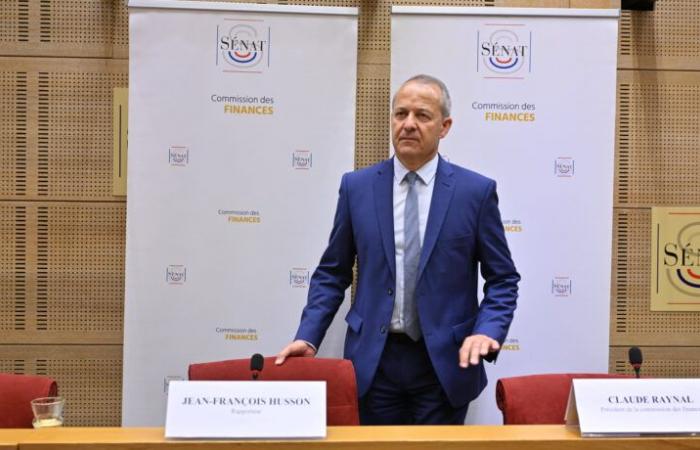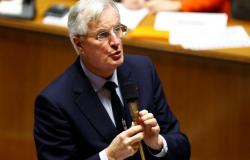
The ball is now in the senators’ court. After the chaotic examination of the finance bill (PLF) in the Assembly, it is a Senate in a position of strength which seizes the 2025 budget. Michel Barnier can count in the High Assembly on the senatorial majority LR- centrist, extended to the groups RDPI (Renaissance), Les Indépendants (majority Horizons) and part of the RDSE. Enough to co-construct this PLF, which arrives in its initial government version, after the rejection of the revenue part by the Assembly.
“No red lines”
If the rapporteur “supports” the draft budget, the Senate does not intend to make its mark any less. In view of the session, which will last from November 25 to December 12, the senators took an important step this Wednesday morning: the general rapporteur of the budget, Senator LR Jean-François Husson, presented his 28 amendments to the Finance Committee and its main points on the first part, which concerns recipes. If they have been adopted, we must wait for the session for them to be formally voted on, during the debates in the hemicycle. The rapporteur is generally followed.
“We have today entered a state of budgetary emergency,” which “requires us to undergo a massive recovery,” he said late in the afternoon during a press conference. . Although he recalls coming from a “liberal” political family, he has “no red line”. In other words, he accepts the tax increases on businesses or the richest proposed in the government text. To “try to bring people together”, he defends a “spirit of commando for France, or of resistance”.
The Senate wants to “maintain the coherence of the text”
Faced with the tax increases adopted in the Assembly, the senator from Meurthe-et-Moselle said “I understand the final rejection of the text by our fellow deputies because the modified text no longer had any coherence, it was no longer acceptable “. “However, without a text adopted by the National Assembly, the text adopted by the Senate will serve as a reference for discussions in the joint joint committee,” recalled Jean-François Husson this morning in front of his colleagues, according to the text of his remarks made in commission.
“This gives us two important responsibilities during the examination in the Senate: on the one hand, to maintain the coherence of this text, which the Assembly was unable to achieve; on the other hand, maintain the objective of recovering public finances,” he adds.
4 billion additional savings to “allow tax increases to be reduced”
As publicsenat.fr explained, the objective of the senatorial majority is to strengthen economies to limit tax increases, while maintaining general “balance”. The Senate will therefore propose reducing spending for a “total of 4 billion euros” additional, “and these savings should allow us to reduce tax increases”, explains the general rapporteur. Useful clarification regarding savings, formulated in committee:
In terms of savings, Jean-François Husson embarked on “an expenditure review”, mission by budgetary mission. He cites pell-mell “150 million euros” in savings on apprenticeship – “is it normal for the State to continue to grant 6,000 euros to the largest companies when they recruit an apprentice with bac + 3 or more ? » – overbudgeting in National Education for training, the elimination of the SNU, the reduction of operators’ jobs, the excessive cash flow of operators or even the National Research Agency. The rapporteur also plans to “tighten” State Medical Aid by “200 million euros” or to lower the ceiling of various taxes, saving the State several million euros.
Also note an amendment from the rapporteur which plans to increase “by 200 million euros the withdrawal made from the treasury of the National Cinema Center (CNC), to bring it to 650 million euros”, which “does not will have no impact on its ability to mobilize funding for cinema,” supports the amendment.
Removal of the increase in electricity tax: a cost of 3.4 billion euros
Another strong point of the senatorial-style budget: the elimination of the increase in the electricity tax. “Our committee is not in favor of increasing electricity taxation beyond its pre-crisis level,” announces Jean-François Husson, while the government text plans to allow the excise to be increased on electricity up to around 50 euros per MWh. Its level before the energy crisis is 32.44 euros/MWh. The subject also caused controversy in the Assembly. The amendment was adopted unanimously in committee.
“A commitment had been made to the French and I do not think it is right to take advantage of the upcoming drop in electricity prices to increase taxes. Furthermore, this increase in excise duties on electricity corresponds neither to an objective of social justice, nor to that of the necessary energy transition”, justifies the general rapporteur, who simply proposes “to remove the possibility left to the government by the “article 7 of the PLF to increase excise duties”. “This proposal reduces the tax increase for all French people by 3.4 billion euros,” specifies Jean-François Husson. Or a cost that he “fully assumes” and which will be “fully compensated”.
Increase in gas tax which brings in 950 million euros
The rapporteur intends in particular to finance it “by a slight increase in taxation on gas”, aiming for “the start of convergence” with low-carbon energies. The amendment plans to increase the excise duty on natural gas for fuel use by 4 euros per MWh.
Which “represents an increase of around 62 euros per year in the cost of gas heating for a household living in housing with a surface area of 100 m²”, specifies the purpose of the amendment. Enough to still bring in “950 million euros” to the state coffers.
The “better supervised” research tax credit: 400 million euros in savings
Still to finance the elimination of the increase in taxes on electricity, the rapporteur also relies on the savings already mentioned, as well as on the insertion of “anti-abuse and anti-fraud devices” in the PLF.
Jean-François Husson proposes in particular to “better regulate the research tax credit” by implementing certain recommendations from the expenditure review of the General Inspectorate of Finance on aid to businesses. Enough to bring in “a little more than 400 million euros in savings”.
Amendment against dividend arbitrage fraud, “cum cum”
He also intends to “work on the question of dividend arbitrage fraud – the famous subject of “CumCum” – with the aim of proposing a system before the examination in public session”, a subject on which the senator is working in particular centrist Nathalie Goulet. Between now and the meeting, “other amendments” should still be proposed.
Jean-François Husson also plans an “anti-avoidance” system as part of the exceptional contribution to the profits of large companies, created in this PLF. It “aims to prevent certain companies from managing, through optimization strategies, to leave the scope of the tax by artificially reducing their turnover for the second year of application of the tax”.
As for the increase in the automobile penalty, the rapporteur, who defends an ecological fiber, did not return to it in committee. But we cannot exclude that this will evolve during the session. Other proposals are still to come, including perhaps transpartisan ones. The rapporteur hopes to build “unusual bridges”, notably “perhaps in housing, by finding landing points where we all meet”.
Communities: elimination of 800 million euros in savings on the FCTVA
The last “structuring subject”, in the eyes of the senators, will not be a surprise: it concerns the effort requested from local authorities. The government is asking them for 5 billion euros in savings. If he considers it “necessary for communities to participate in the recovery”, Jean-François Husson intends to adjust this effort.
While the government is aiming for savings of 800 million euros on the VAT compensation fund (FCTVA), the rapporteur intends to remove this measure, which presents “major disadvantages, which make it unacceptable: it is retroactive for investments of the years 2023 and 2024; it will reduce the investment revenues of communities while local investment seems to me to have to be preserved,” pointed out Senator LR during the commission.
Conversely, “the stabilization of the fractions of VAT allocated to communities seems defensible to me”, maintains the rapporteur. “It is certainly not a measure favorable to communities but it is content to create a blank year of increase in these fractions”, underlines the elected official. As for the reserve fund for communities, which represents “3 of the 5 billion efforts”, it will be examined in a second step, the measure appearing in the expenditure part of the PLF. But he “expresses the hope that the Senate will be able to propose an acceptable, reasonable system, which does not penalize fragile communities, and which can even benefit them”. Ultimately, it would not be surprising if the communities, which the Senate represents according to the Constitution, generally benefit from a reduction in the effort required of them.
“There will be a budget voted on in the Senate,” says Claude Raynal, who evokes a CMP “which could be conclusive”
“We will contribute here in the Senate to this 2025 budget, which is a budget of reason. It traces a path which must put an end to the spending drift of recent years, without falling into an irresponsible fiscal frenzy,” concludes Jean-François Husson, who hopes “to find the way through, to find the crest line. It will do it.”
“The Senate will play its role. And the senatorial majority will have the vocation to work with the government to produce a copy that suits both the senatorial majority and the government,” adds for his part the PS president of the finance committee, Claude Raynal. “I am not taking a big risk by saying that there will be a budget voted on in the Senate,” adds the socialist, who comes forward, even mentioning “a CMP which could be conclusive, possibly”. If this “will require a lot of work”, he “can’t imagine” that deputies and senators will not agree on a common text. Before this step, senators will have to spend a few days and nights on the 2025 budget.





